1. Please describe your career path after graduating from the JISPA. How has the JISPA contributed to your career development?
 In retrospect to year 2003 after graduating from JISPA, I was selected by the Governor to be a member of selected working groups in the Governor’s Office responsible for administrative work, in-house training and monetary policy recommendations to the Assistant Governor. Two years later, I became a Junior Economist and a Section Chief, and then in 2008 I was promoted to the Head of Governor’s Office and Deputy Director of the Cabinet in charge of monitoring Cambodia’s macroeconomic performance, banking and financial blueprint and human resource development. These responsibilities provided me with a great opportunity to utilize my knowledge and experience gained in Japan.
In retrospect to year 2003 after graduating from JISPA, I was selected by the Governor to be a member of selected working groups in the Governor’s Office responsible for administrative work, in-house training and monetary policy recommendations to the Assistant Governor. Two years later, I became a Junior Economist and a Section Chief, and then in 2008 I was promoted to the Head of Governor’s Office and Deputy Director of the Cabinet in charge of monitoring Cambodia’s macroeconomic performance, banking and financial blueprint and human resource development. These responsibilities provided me with a great opportunity to utilize my knowledge and experience gained in Japan.
In 2010, I was assigned to lead a Monetary Policy Technical Working Group of the National Bank of Cambodia where I could also work with some young economists and new graduates from overseas. Then, I was promoted to the Director of Economic Research and International Cooperation Department and the Head of the Young Economists Club at the National Bank of Cambodia. These positions also provided opportunities for me to work with government ministries, IMF, ADB, ASEAN, ASEAN+3, and the SEACEN Centre on multilateral basis, and with some central banks from the region on a bilateral basis on common areas on development of the countries. During this period, I could also monitor staff’s competencies and analytical skills to mentor them.
As part of the personnel transfer policy, in 2013, I was promoted to the Deputy Secretary General and Director of Human Resource Department in charge of central bank human resource management, which works closely with line managers and the management to integrate graduates and scholars into line departments. I also joined the regional forums to exchange views and experience on human resource management and development for central banks. During my tenure, I managed the personnel department performing four major roles as Strategic Partner, Change Agent, Administrative Expert, and Employee Champion.
At present, I am the Deputy Secretary General to the National Bank of Cambodia in charge of human resource management and the Governor’s Office. The Governor’s Office is considered as the central filter of work for the bank where the decision making body exists. Therefore, I am in charge of six working groups responsible for: (1) monetary policy; (2) financial stability; (3) banking supervision; (4) human resource management and development; (5) cash management; and (6) the international cooperation.
Overall, let me say that Japan is a strategic partner for our country’s development and also a regional and international learning hub for students and public executives from Asia and transition economies to study and conduct research on national development policies. JISPA plays important roles by providing us with not only the knowledge of a changing world, making/building a partnership, and establishing a network across region but also with the sophisticated skills from Japanese culture and people. So we can use Japan’s experience and working culture alongside our strong leadership and commitments in order to form our technical competencies at work to achieve organization goals.
2. Have you worked on any issues relevant to Japan or regional cooperation? If so, please explain the duties and/or experiences that you had.
As the Director of Economic Research and International Cooperation Department of the National Bank of Cambodia, I worked bilaterally and multilaterally with International/ Regional Financial Institutions and central banks in the regions. Under the ASEAN+3 financial cooperation framework, we at the National Bank of Cambodia work with the technical working groups from the Ministry of Finance of Japan, the Bank of Japan, and those from other ASEAN+3 members to enhance regional financial cooperation and develop a regional financial safety net, aimed at ensuring financial stability and development as well as promoting sustainable economic prosperity in the region.
Today the progress of ASEAN+3 financial cooperation has been made noticeable by establishing and developing a regional financial safety net through CMIM, enhancing regional macroeconomic and financial surveillance through ASEAN+3 Macroeconomic Research Office (AMRO), developing regional bond markets through Asian Bond Market Initiatives (ABMI), and so on. In addition, new developmental and cooperative initiatives have been vigorously discussed including joint research, capacity building, infrastructure financing, natural disaster insurance, and using local currency in trade settlement, etc.
In addition, we also worked with JICA in terms of building capacity and conducting joint research on de-dollarization and promotion of the use of the Riel, Cambodia’s national currency.
Not just at a technical level, a great deal of cooperative work between Cambodia and Japan has also been done at a higher, national level and in various areas of development, which ranges from diplomatic and political relation, social and economic development, to cultural exchange. Such cooperation and assistance have been beneficial and invaluable to Cambodia.
3. You are currently working as Deputy Secretary General, National Bank of Cambodia. Could you please briefly outline your duties as the Deputy Secretary General, mentioning any challenging issues that you are facing (if there are any)?
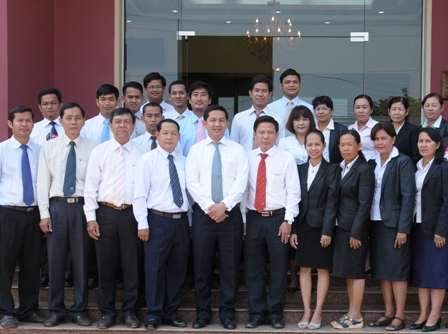 The National Bank of Cambodia is a leading and independent state institution, which is free from the intervention of the Government. As the central bank, NBC plays important roles in maintaining price stability to support Cambodia’s sustainable economic development. Promotion to the management position of the Deputy Secretary General of the National Bank of Cambodia is very competitive. At a director level, one has to show one’s strong technical competencies, leadership and management skills, then one will be categorized as a successful technical person and placed on the track to promotion into management level responsible for decision making and policy formulation at the central bank.
The National Bank of Cambodia is a leading and independent state institution, which is free from the intervention of the Government. As the central bank, NBC plays important roles in maintaining price stability to support Cambodia’s sustainable economic development. Promotion to the management position of the Deputy Secretary General of the National Bank of Cambodia is very competitive. At a director level, one has to show one’s strong technical competencies, leadership and management skills, then one will be categorized as a successful technical person and placed on the track to promotion into management level responsible for decision making and policy formulation at the central bank.
As the Deputy Secretary General, I was designated as the Secretary for the Board of Directors of the National Bank of Cambodia, and I am in charge of human resource management, monitoring of macroeconomic performance, and the general administration of the Bank. The main challenges facing me are to enhance the effectiveness of human resource management within our organization in line with international norms and fast economic development. Since the regional market is becoming more integrated, a battle for talents has started. Potential staff is scarce, but the human capital is necessary for organizations to function and generate a successes. I was assigned by the management to lead a working group to redraft staff policy for suitable selection of human resources, a retention policy like health insurance and staff loans, a recruitment policy and a succession plan within our organization in order to attract potential staff who would spill over to the private sector.
4. Please describe the economic outlook of Cambodia and any policy challenges (this answer can be combined with Question 3).
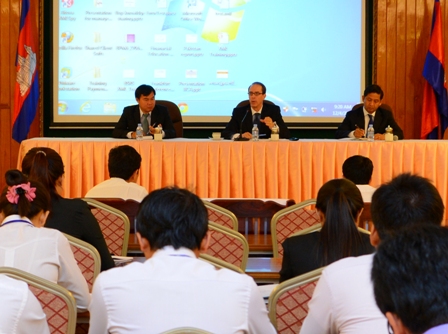 Cambodia’s economy has registered remarkable growth for the past two decades, with an average growth rate of 7.7%. With this outstanding performance, Cambodia was classified by the World Bank as an Olympian of growth. The living standards of the people have continuously improved, and the poverty rate significantly fell from more than 53.2% in 2004 to 17.7% in 2012. This continued high growth, together with political stability and sound macroeconomic management, makes the outlook of Cambodia’s economy highly favorable. The IMF and other international organizations recently projected a 7% growth rate on average for Cambodia in the medium term, despite current global economic uncertainty.
Cambodia’s economy has registered remarkable growth for the past two decades, with an average growth rate of 7.7%. With this outstanding performance, Cambodia was classified by the World Bank as an Olympian of growth. The living standards of the people have continuously improved, and the poverty rate significantly fell from more than 53.2% in 2004 to 17.7% in 2012. This continued high growth, together with political stability and sound macroeconomic management, makes the outlook of Cambodia’s economy highly favorable. The IMF and other international organizations recently projected a 7% growth rate on average for Cambodia in the medium term, despite current global economic uncertainty.
To sustain Cambodia’s high growth path, existing and emerging challenges need to be appropriately addressed, mainly by boosting such existing drivers of growth as tourism, clothing, agriculture, and construction, and at the same time exploring new growth potentials. To achieve these aims, it is realized that the following areas will make crucial contributions; infrastructure development, investment promotion, human resource development, financial sector stability and development, coupled with necessary structural reforms and social protection policies.
5. Please briefly describe your student days in Japan, such as your major and research interest, as well as your experience of life in Japan.
I spent my two-year MBA study period from 2001-2003 at Yokohama National University. My life as a foreign student reached another turning point when I got the scholarship to study in Japan. It was a great opportunity for me to be able to pursue my higher education and to experience a new and amazing life in a developed country like Japan. Honestly speaking, I personally experienced a lot of changes in terms of socio-economic development, diplomatic relations and the studies of development policy. Let me say I believe that our knowledge come from observing, the experience come from doing, and the technical competence come from practicing, as with scientists.
Before going to Japan I was so lucky to be invited to meet in person with H.E. Chea Chanto, Governor of the National Bank of Cambodia and H.E. Sum Sannisith, Assistant Governor in charge of human resource management, to discuss about the central bank goals and the changing roles of the central bank in the future. The governor also advised me on the importance of independence of the central bank, Cambodia’s monetary policy framework in context of our highly dollarized economy, and ways to develop the banking sector in Cambodia while our country is integrating into ASEAN region. The meeting encouraged me and provided me with the confidence to study in Japan. There I was able to learn advanced skills in management, economics, and leadership from the Yokohama National University and could beneficially apply these skills and develop my career back home.
In particular, I could meaningfully advance my research interest in macroeconomic management, monetary policy and de-dollarization policy design, particularly in the case of Cambodia. Besides that, I could experience new, different cultures, people and places which taught me a great deal about social, non-academic life, which broadened my conscience and understanding of society as a whole.
6. Any message to the current JISPA scholars studying in Japan as well as potential candidates?
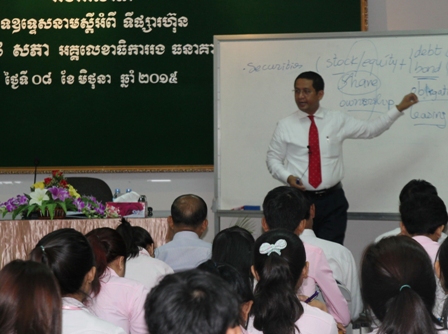 Hello my friends and colleagues! I am so proud to be a part of JISPA. I think that you are also so lucky to obtain JISPA scholarships to study in Japan, one of the top industrialized economies in the world. The program provided me with three valuable assets: knowledge of the changing world, networking, and friends from across the region. I truly benefited a lot in terms of technical competence and genteel skills from this program and have been able to contribute to policy development in Cambodia. Thus, I would like to recommend future candidates to participate in this program.
Hello my friends and colleagues! I am so proud to be a part of JISPA. I think that you are also so lucky to obtain JISPA scholarships to study in Japan, one of the top industrialized economies in the world. The program provided me with three valuable assets: knowledge of the changing world, networking, and friends from across the region. I truly benefited a lot in terms of technical competence and genteel skills from this program and have been able to contribute to policy development in Cambodia. Thus, I would like to recommend future candidates to participate in this program.
7. Do you have any message that you wish to mention to Japan?
Profiting from this opportunity, I would like to express my profound thanks to the Japanese Government, Japanese people, the IMF, professors, and especially to JISPA for making this program available for junior officials from transition economies and essentially for changing me, my career life and my future into a much better and more useful one.
The scholarships supported by the Japanese Government and the Japanese people have been very important and provide opportunities for Cambodian people to learn from the successful experience of Japan in social and economic development. I highly value the great contribution from this scholarship for Cambodia while we are developing our country. Japan’s assistance will never be forgotten by the Cambodian people. I hope that the Japanese government and people will continue to provide such important assistance to Cambodia.
Back to top

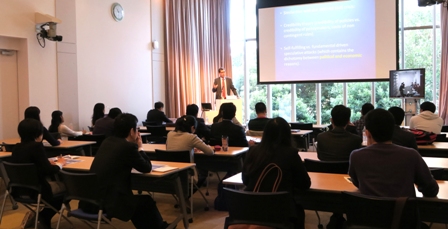
 JISPA Seminar: On April 15, 2015, the JISPA seminar entitled "the Euro Area Crisis: its Reasons and the Perspectives for its Resolution" was delivered by Prof. Pompeo Della Posta, the University of Pisa and Yokohama National University. The JISPA scholars and representatives from the Japanese Ministry of Finance participated in the seminar. Please read a scholar’s comment on this seminar:
JISPA Seminar: On April 15, 2015, the JISPA seminar entitled "the Euro Area Crisis: its Reasons and the Perspectives for its Resolution" was delivered by Prof. Pompeo Della Posta, the University of Pisa and Yokohama National University. The JISPA scholars and representatives from the Japanese Ministry of Finance participated in the seminar. Please read a scholar’s comment on this seminar: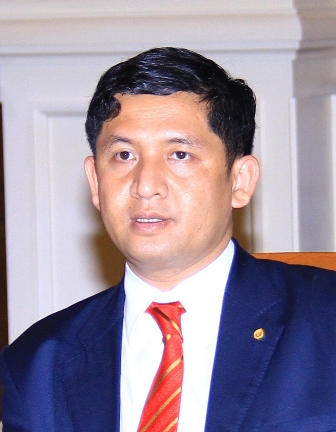 Mr. Thai Saphear has been working as the Deputy Secretary General of the National Bank of Cambodia. He was a 2001-03 scholar, and graduated from Yokohama National University. Here is an interview with Mr. Thai Saphear.
Read More
Mr. Thai Saphear has been working as the Deputy Secretary General of the National Bank of Cambodia. He was a 2001-03 scholar, and graduated from Yokohama National University. Here is an interview with Mr. Thai Saphear.
Read More Mr. Munkhbayar Purevdorj, a 2014-16 JISPA scholar studying at Hitotsubashi University is from the National Bank of Mongolia. He likes travelling and playing chess.
Read More
Mr. Munkhbayar Purevdorj, a 2014-16 JISPA scholar studying at Hitotsubashi University is from the National Bank of Mongolia. He likes travelling and playing chess.
Read More
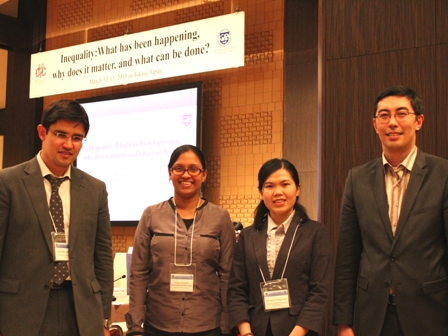

 Scholar’s Comment on the JISPA Seminar: On April 15, 2015, Mr. Pompeo Della Posta (professor at the University of Pisa and visiting professor at Yokohama National University) gave a wonderful presentation exclusively for the JISPA scholars and their professors on "The euro area crisis: its reasons and the perspectives for its resolution". The presentation, which was an overview of the economic and political causes and the solutions of the euro area crisis, raised the interest of the audience, leading to an active Q&A session. The scholars and faculty put forward questions and comments, focusing especially on the creation of a European Banking Union, and on the ECB’s monetary and fiscal responses to preserve the Eurozone, e.g. quantitative easing, ZLB on interest rates, and buying sovereign bonds on the secondary market.
Scholar’s Comment on the JISPA Seminar: On April 15, 2015, Mr. Pompeo Della Posta (professor at the University of Pisa and visiting professor at Yokohama National University) gave a wonderful presentation exclusively for the JISPA scholars and their professors on "The euro area crisis: its reasons and the perspectives for its resolution". The presentation, which was an overview of the economic and political causes and the solutions of the euro area crisis, raised the interest of the audience, leading to an active Q&A session. The scholars and faculty put forward questions and comments, focusing especially on the creation of a European Banking Union, and on the ECB’s monetary and fiscal responses to preserve the Eurozone, e.g. quantitative easing, ZLB on interest rates, and buying sovereign bonds on the secondary market.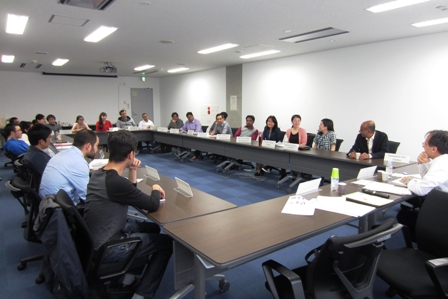
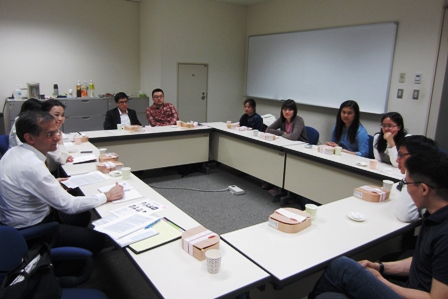
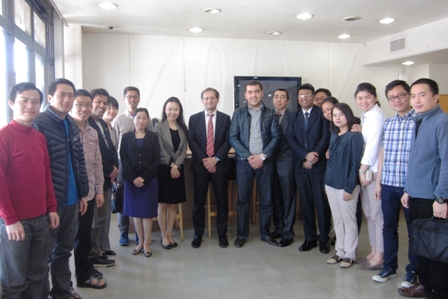
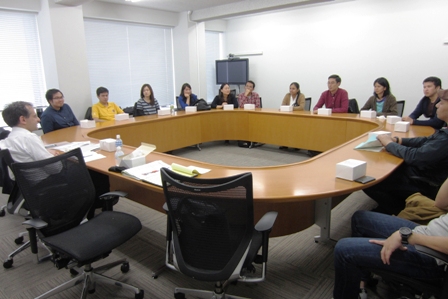
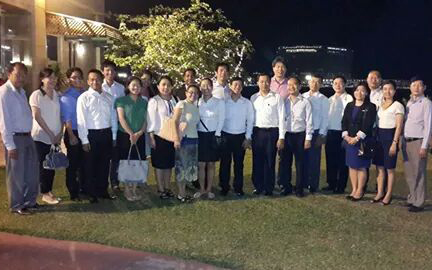 Alumni Gathering in Cambodia: On the occasion of the professors’ visit to Cambodia, a JISPA alumni gathering was held in Phnom Penh on March 23, 2015. The gathering was attended by Prof. Yuqing Xing, National Graduate Institute for Policy Studies, and Prof. Ching-Yang Lin, the International University of Japan, together with Mr. Faisal Ahmad, the IMF Resident Representative for Cambodia. The JISPA-Cambodia alumni talked about their present positions and memories of their studies in Japan with the professors and Mr. Ahmed.
Alumni Gathering in Cambodia: On the occasion of the professors’ visit to Cambodia, a JISPA alumni gathering was held in Phnom Penh on March 23, 2015. The gathering was attended by Prof. Yuqing Xing, National Graduate Institute for Policy Studies, and Prof. Ching-Yang Lin, the International University of Japan, together with Mr. Faisal Ahmad, the IMF Resident Representative for Cambodia. The JISPA-Cambodia alumni talked about their present positions and memories of their studies in Japan with the professors and Mr. Ahmed. In retrospect to year 2003 after graduating from JISPA, I was selected by the Governor to be a member of selected working groups in the Governor’s Office responsible for administrative work, in-house training and monetary policy recommendations to the Assistant Governor. Two years later, I became a Junior Economist and a Section Chief, and then in 2008 I was promoted to the Head of Governor’s Office and Deputy Director of the Cabinet in charge of monitoring Cambodia’s macroeconomic performance, banking and financial blueprint and human resource development. These responsibilities provided me with a great opportunity to utilize my knowledge and experience gained in Japan.
In retrospect to year 2003 after graduating from JISPA, I was selected by the Governor to be a member of selected working groups in the Governor’s Office responsible for administrative work, in-house training and monetary policy recommendations to the Assistant Governor. Two years later, I became a Junior Economist and a Section Chief, and then in 2008 I was promoted to the Head of Governor’s Office and Deputy Director of the Cabinet in charge of monitoring Cambodia’s macroeconomic performance, banking and financial blueprint and human resource development. These responsibilities provided me with a great opportunity to utilize my knowledge and experience gained in Japan.
 The National Bank of Cambodia is a leading and independent state institution, which is free from the intervention of the Government. As the central bank, NBC plays important roles in maintaining price stability to support Cambodia’s sustainable economic development. Promotion to the management position of the Deputy Secretary General of the National Bank of Cambodia is very competitive. At a director level, one has to show one’s strong technical competencies, leadership and management skills, then one will be categorized as a successful technical person and placed on the track to promotion into management level responsible for decision making and policy formulation at the central bank.
The National Bank of Cambodia is a leading and independent state institution, which is free from the intervention of the Government. As the central bank, NBC plays important roles in maintaining price stability to support Cambodia’s sustainable economic development. Promotion to the management position of the Deputy Secretary General of the National Bank of Cambodia is very competitive. At a director level, one has to show one’s strong technical competencies, leadership and management skills, then one will be categorized as a successful technical person and placed on the track to promotion into management level responsible for decision making and policy formulation at the central bank.  Cambodia’s economy has registered remarkable growth for the past two decades, with an average growth rate of 7.7%. With this outstanding performance, Cambodia was classified by the World Bank as an Olympian of growth. The living standards of the people have continuously improved, and the poverty rate significantly fell from more than 53.2% in 2004 to 17.7% in 2012. This continued high growth, together with political stability and sound macroeconomic management, makes the outlook of Cambodia’s economy highly favorable. The IMF and other international organizations recently projected a 7% growth rate on average for Cambodia in the medium term, despite current global economic uncertainty.
Cambodia’s economy has registered remarkable growth for the past two decades, with an average growth rate of 7.7%. With this outstanding performance, Cambodia was classified by the World Bank as an Olympian of growth. The living standards of the people have continuously improved, and the poverty rate significantly fell from more than 53.2% in 2004 to 17.7% in 2012. This continued high growth, together with political stability and sound macroeconomic management, makes the outlook of Cambodia’s economy highly favorable. The IMF and other international organizations recently projected a 7% growth rate on average for Cambodia in the medium term, despite current global economic uncertainty. Hello my friends and colleagues! I am so proud to be a part of JISPA. I think that you are also so lucky to obtain JISPA scholarships to study in Japan, one of the top industrialized economies in the world. The program provided me with three valuable assets: knowledge of the changing world, networking, and friends from across the region. I truly benefited a lot in terms of technical competence and genteel skills from this program and have been able to contribute to policy development in Cambodia. Thus, I would like to recommend future candidates to participate in this program.
Hello my friends and colleagues! I am so proud to be a part of JISPA. I think that you are also so lucky to obtain JISPA scholarships to study in Japan, one of the top industrialized economies in the world. The program provided me with three valuable assets: knowledge of the changing world, networking, and friends from across the region. I truly benefited a lot in terms of technical competence and genteel skills from this program and have been able to contribute to policy development in Cambodia. Thus, I would like to recommend future candidates to participate in this program.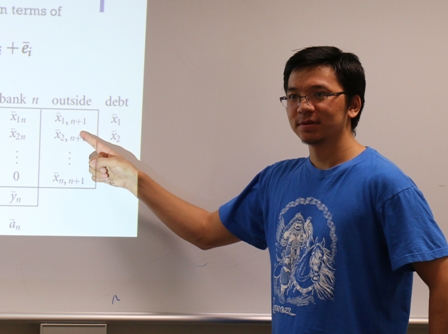 Japan has for long time been known for its superior quality education. Japanese universities are among the best in the world. This is the main reason why I applied for JISPA. Besides I had always wondered how Japan had become such a superpower, hence my interest towards Japanese people, lifestyle, and culture.
Japan has for long time been known for its superior quality education. Japanese universities are among the best in the world. This is the main reason why I applied for JISPA. Besides I had always wondered how Japan had become such a superpower, hence my interest towards Japanese people, lifestyle, and culture.
 Studying at Hitotsubashi University introduces me to various analytical and theoretical tools. Here I study public policy, international economics, monetary policy, finance and econometrics. Upon graduating from the university, I will be equipped with advanced techniques and knowledge in economics. And I am sure I will be able to contribute more to the development of my country.
Studying at Hitotsubashi University introduces me to various analytical and theoretical tools. Here I study public policy, international economics, monetary policy, finance and econometrics. Upon graduating from the university, I will be equipped with advanced techniques and knowledge in economics. And I am sure I will be able to contribute more to the development of my country.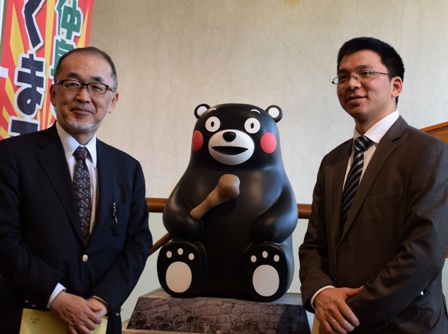 Before coming here, I heard many times that the Japanese were very polite and tactful. And now experiencing the Japanese way of living, I have realized that being polite goes beyond simply smiling at each other. For the Japanese it is the meaning of respect, “putting other people first” - this is what lies behind it. The Japanese are always and in every situation polite! This is just amazing!
Before coming here, I heard many times that the Japanese were very polite and tactful. And now experiencing the Japanese way of living, I have realized that being polite goes beyond simply smiling at each other. For the Japanese it is the meaning of respect, “putting other people first” - this is what lies behind it. The Japanese are always and in every situation polite! This is just amazing!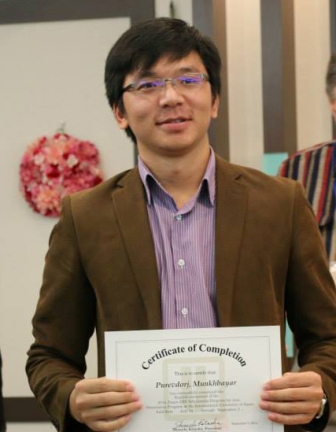 I envisage two ways of utilizing it. Firstly, I would like to put my knowledge and skills obtained here into developing more advanced models and techniques which could provide deeper insight into the development of our economy. And secondly, I’m going to share the knowledge and skills I possess with my colleagues at the Central bank.
I envisage two ways of utilizing it. Firstly, I would like to put my knowledge and skills obtained here into developing more advanced models and techniques which could provide deeper insight into the development of our economy. And secondly, I’m going to share the knowledge and skills I possess with my colleagues at the Central bank. JISPA scholarship is a rare opportunity for hundreds and hundreds of young people from around Asia to make their dream come true! And I would like to thank JISPA for their great job in making the world a better place to live.
JISPA scholarship is a rare opportunity for hundreds and hundreds of young people from around Asia to make their dream come true! And I would like to thank JISPA for their great job in making the world a better place to live.